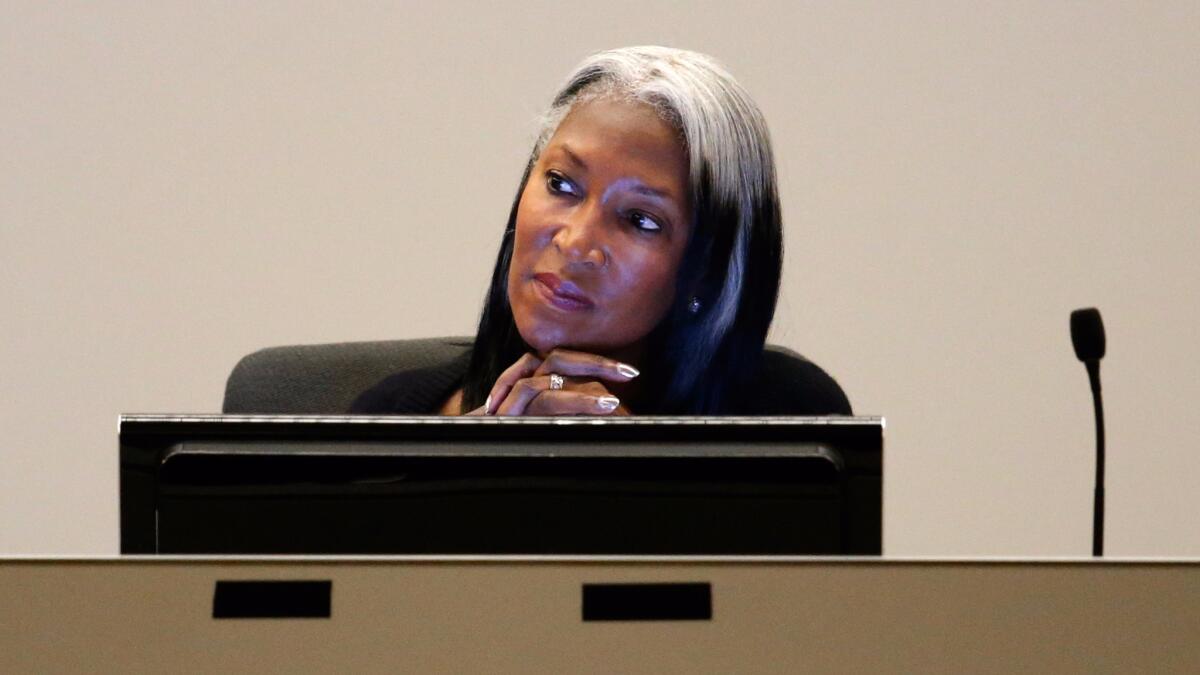L.A.’s newest police commissioner calls for a deep analysis of racial profiling accusations

Los Angeles’ newest police commissioner called for a deep analysis Tuesday of how the LAPD handles complaints alleging racial profiling, an issue that has long stirred frustration among some residents and members of the police oversight panel.
The directive from Cynthia McClain-Hill, backed by a unanimous vote from the rest of the Police Commission, came after a quarterly report from LAPD brass that again found that the department had not upheld any allegations of biased policing — police parlance for racial profiling.
Questioning whether the department’s data “captures the full extent of inappropriate or biased encounters,” McClain-Hill instructed the LAPD to put together a report looking at how many biased policing allegations other major departments receive and uphold.
She also called for more information about how the LAPD tries to identify bias in potential recruits, what incoming officers learn about bias during their time in the academy and how supervisors are trained to guard against it.
The LAPD will present the information at the Police Commission’s Nov. 1 meeting, where, in an unusual move, biased policing will be the only item on the board’s agenda. McClain-Hill asked to hold that meeting outside of the LAPD’s downtown headquarters — the commission’s usual gathering spot — to better accommodate residents who want to attend.
McClain-Hill emphasized that she did not believe most LAPD officers are “inherently biased or show up to work for any reason other than to do the very best job they can protecting this city.” The goal, she said, was to have a “robust discussion on the topic.”
“There’s a lot of energy, a lot of frustration and a lot of, I think, genuine pain and concern being brought forward around a matter that we absolutely don’t have our arms around,” she said. “There really and truly has to be a way that we can move through this into a place where both the community and the department are comfortable with where we are.”
Like police departments across the country, the LAPD has long wrestled with how to effectively address allegations of biased policing by officers. Such accusations are difficult to prove, as they hinge on what an officer is thinking when he or she stops someone. But the perception of racial profiling has frayed relationships between police and communities across the country, including Los Angeles.
The LAPD usually receives a few hundred such complaints each year, largely from African Americans. None have been upheld, a statistic one LAPD commander called “the elephant in the room” at Tuesday’s meeting.
That number has become more glaring in recent years as residents and police commissioners continue to voice their concerns.
“I don’t think anybody believes that there are actually no incidents of biased policing,” Matt Johnson, the Police Commission’s president, said last winter. “The problem is we don’t have an effective way of really adjudicating the issue.”
LAPD brass have stressed that they take the allegations seriously, noting that the department tried to fire an officer a few years ago after investigators determined he stopped Latino drivers based on their ethnicity. However, a disciplinary panel found that officer not guilty of the biased policing allegations and fired him on a different charge.
On Tuesday, LAPD Chief Charlie Beck said that the accusations of biased policing stemmed from a “small, small fraction” of the millions of contacts between officers and residents each year. He said he believed the LAPD had a strong internal system to identify and investigate those allegations.
But, he said, it was still important to talk with officers about bias and policing.
“We all have biases — it’s not whether you have them or not, it’s whether you act on them,” he said. “They cannot affect your job performance. They cannot affect why you enforce the law or how you enforce the law.”
Follow me on Twitter: @katemather
ALSO
SoCal Gas to pay $4-million settlement over massive Porter Ranch gas leak
Driver of stolen big rig carrying hazardous material surrenders after pursuit
Rams reach deal with L.A. city officials to pay for stadium security
More to Read
Sign up for Essential California
The most important California stories and recommendations in your inbox every morning.
You may occasionally receive promotional content from the Los Angeles Times.











